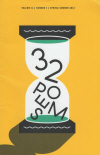32 Poems – Spring/Summer 2013
Each issue of 32 Poems is an intimate encounter that is made the perfect size with clever cover art that makes me want to carry it around everywhere. This issue of 32 Poems features cover art from Elliot Walker as well as a humorous back cover titled “32 Things We Really Should Apologize For” by Aaron Alford and Liz Anderson Alford. Literally, this issue of 32 Poems is a must read from front to back.
Each issue of 32 Poems is an intimate encounter that is made the perfect size with clever cover art that makes me want to carry it around everywhere. This issue of 32 Poems features cover art from Elliot Walker as well as a humorous back cover titled “32 Things We Really Should Apologize For” by Aaron Alford and Liz Anderson Alford. Literally, this issue of 32 Poems is a must read from front to back.
Luke Johnson’s poem “Burn the Scarecrow” captivates readers immediately; it has numerous levels and is well worth a read. The poem tells the story of a son who is burning a scarecrow because his mother, who is receiving chemo, told him to do so. The scarecrow serves literally and figuratively as a dummy for which the chaos of the situation to move through. The poem has a ritualistic and elegistic feel; it begins:
Remember the smell of the match gone out.
Remember gust after gust bending stalks
as you cupped your hands around slow-burning
cornsilk jammed in the wristless sleeves.
Remember night, heat on your palms.
And your mother, chemo-ravaged
The constant use of the word “remember” combined with words such as “match”, “gust”, and “slow-burning” alludes to ritual, to a conjuring, to remembering. In just the first three stanzas, Johnson displays a very tight writing style in which every word has been carefully chosen to reinforce another. This ritualistic conjuring continues and reaches almost a delusional point:
and still, watching from a candlelit porch.
she reached for your wrist that morning,
said only, I want you to burn the scarecrow.
So you did: you soaked its workshirt in kerosene
and watched black smoke lick button-eyes
hollow: an effigy burning itself to a cross.
The speaker’s memories of interactions with the mother are fragmented, and when this notion is put next to watching “black smoke lick button-eyes,” the sense is of a room spinning or some ritual-induced delusion.
Another ritualistic poem worth mentioning is “Moon” by James Henery Knippen which uses the art of repetition along with some compelling linguistic work to leave a major impact on the reader. It begins:
Wet moon on bluestem, if sound
is enough. If sound is enough,
Trillium tryst. Mouth full of
dark roses, if image is enough. If
image is enough, weeping gladiolus.
A typical aim of repetition within a poem is the attempt to rid the speaker of some sort of trauma, and Knippen’s way of ending a sentence with the same few words and then beginning the next one with the same set of words seems to approach this. “Mouth full / of dark roses, if image is enough,” followed by beginning the next sentence with “If image is enough,” challenges the reader, saying: If image is enough, then imagine weeping gladiolus because that is really what I am saying. The speaker wants the reader to imagine these sounds and images so the speaker no longer has to. Knippen uses repetition to raise the intensity as the speaker tries to forget the trauma, until the poem ends with the speaker asking the reader to “incinerate” everything:
when the hedge is one fire. If Love
is enough, chrysanthemum kiss.
Blue light licks the lakeshore
if the moon’s a damned liar. If the
moon’s wet enough, incinerate this.
Sasha West’s poem “We Navigate the River of Tar Under that Tethered Balloon of Light” begins by commanding the reader to “Listen,” which brings urgency to the situation. The speaker is trying to warn about a deceitful man by drawing on the act of fishing:
Listen: Failures skin was a sheet
stretched to be a screen
the rough weigh of canvas;
those things he showed me flickered
on his flesh like a tide of luminescent fish,
like lapping tongues of fire, without
the images changing him. . . .
After creating somewhat of a surrealist feel with mention of “tongues of fire” and “images changing him,” the speaker explains the haunting feeling, and the poem begins to turn cold:
. . . I never learned
what projected those stories–if
you could dissect him on a table,
would you find the apparatus?
These lines remind me of a biology class or a surgical procedure, which creates a cold and desolate tone. It resonates as the poem reveals how and where the speaker’s relationship with this man ended.
Not only should you pick up the most recent copy of 32 Poems right now, you should probably buy a copy for all your friends for the holidays. Then, you should just go ahead and subscribe to it because if you don’t, you’ll regret it. It truly is a well put together journal with work from tons of great writers. It is only proper to end this with a quote from the backcover’s list of “32 Things We Really Should Apologize For”: “#27 That time we tried to be cool and said, ‘You only YOLO once!’”
[www.32poems.com]





